Vanishing act
The end of Esa-Pekka Salonen’s brief time with the San Francisco Symphony left a gaping hole
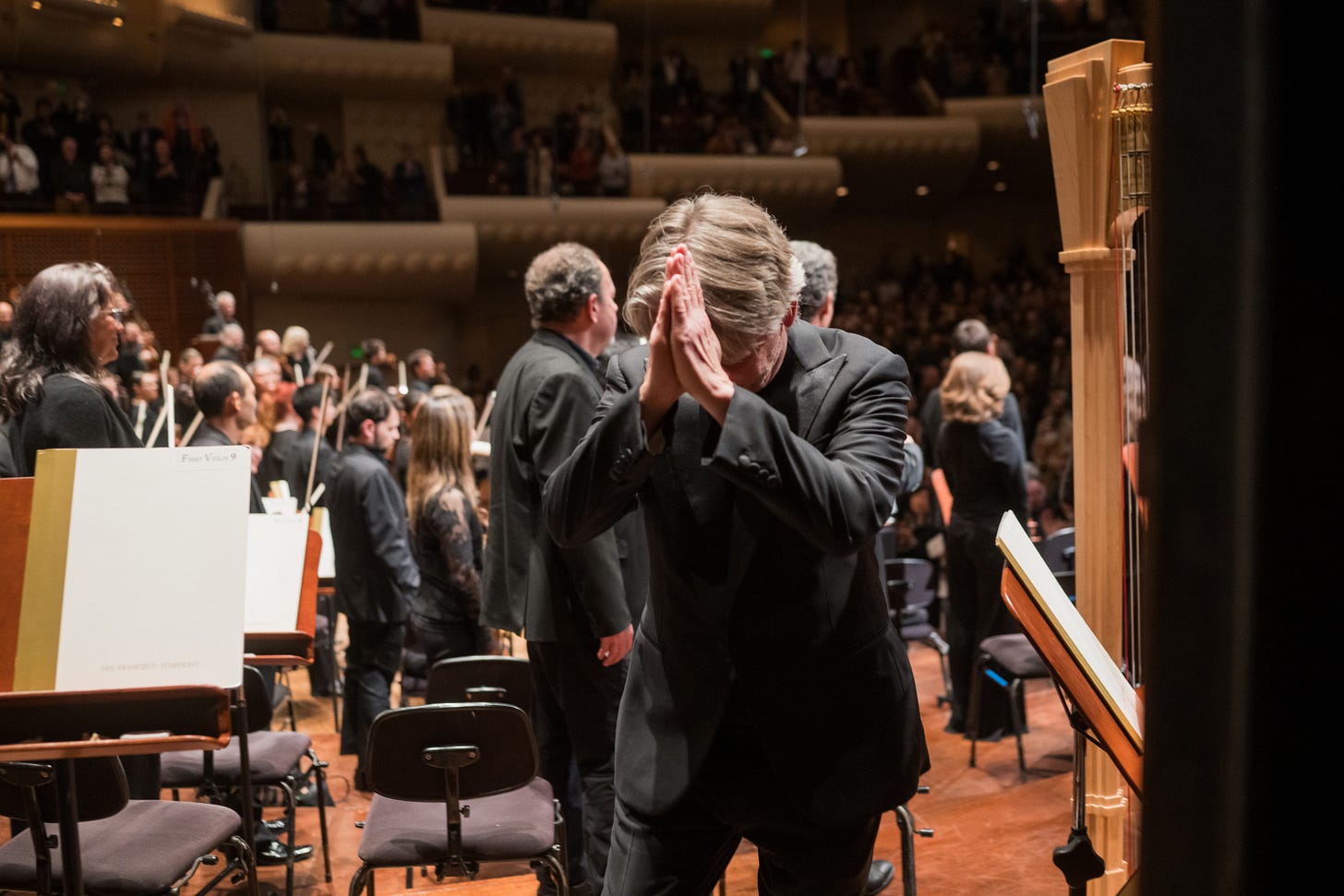
And just like that, he’s gone.
Esa-Pekka Salonen conducted his final concerts as music director of the San Francisco Symphony last week, three powerful, incendiary performances of Mahler’s Second Symphony. I reviewed the first of these for the Chronicle, and Lisa Hirsch attended the last one to capture the tone and spirit of the evening. Now the organization that I and so many people in the Bay Area dearly love — the orchestra that has been at the weekly center of my musical life for the past 40 years — embarks on an extended period of uncertainty, without artistic leadership and under management and board leadership that may or may not be equal to the moment. It’s heartbreaking.
I wasn’t sure I had any more to offer about this unfortunate series of events — not after all the doom-mongering and rethinking and updating that has been lavished on the subject over the past year and more. What more is there to say that hasn’t already been said? Yet the subject nags at me, like an aching tooth. We’ve been watching a preventable catastrophe unfold around us, as we stand on the sidelines yelling “nooooooo” like the witnesses to some cheesy slow-motion film collision. And none of it makes any sense! Who wanted this? Who benefits? Why would anyone look at the current situation and think The way to make this orchestra really great would be to drive out one of the world’s leading music directors?
There are no answers to these questions — certainly none that reflect any credit on the board of the San Francisco Symphony. I mean, sure, let’s stipulate that there are financial pressures at work here, with deficits rising and donations drying up. But presumably in that case, you address financial problems with financial solutions. You don’t begin by watering down the very things that make people want to support your organization in the first place.
Instead, the very governing body that was supposed to ensure the orchestra’s health and longevity and continued excellence has wound up making it the embarrassment of the musical world. This orchestra, which for decades has been a source of international pride for San Francisco and the greater Bay Area, is now a byword for mismanagement and short-sightedness. And that’s not going to go away anytime soon.
Because here’s the thing: An orchestra doesn’t need Esa-Pekka Salonen to succeed. We can prove that empirically from the simple fact that there are now no orchestras in the entire world that have Salonen as their music director, and yet some orchestras are faring perfectly well without him. What an orchestra does need is smart, capable leadership — the kind that would have understood what Salonen’s presence has meant to this orchestra and this community, and acted accordingly. Salonen’s departure is tragic, given everything he’s accomplished in a short time and everything he might yet have accomplished. But his departure is a symptom; it’s not the ailment.
The real, lingering problem is that even after Salonen is gone, the Symphony will still be in the hands of those who drove him out. The choice of the next music director will be left to the very people who thought Salonen was dispensable; how much faith do you have in their judgment? Patrons will be asked to step up their support for an organization that will now offer them less reason to feel excited about or committed to what is happening in Davies Symphony Hall. And keep your eye on the orchestral personnel — on the vacancies that go unfilled and the high-profile departures that occur because San Francisco is no longer perceived as a good career investment.
Angry? You’re goddam right I’m angry.
Elsewhere:
Lisa Hirsch, reviewing Thursday’s concert for SFCV: “The performance… was an electrifying triumph for Salonen and every one of the musicians, exceeding even the excellent presentation of Mahler’s Second heard here in 2022. The conductor’s departure, after a too short tenure truncated by the COVID-19 pandemic, certainly added to the already vast emotional weight of the piece.”
Mark Swed, Los Angeles Times (paywall): “Salonen’s more acute approach, not exactly angry but exceptionally determined, was another kind of monument to the power of sound. In quietest, barely audible passages, the air in the hall had an electric sense of calm before the storm. The massive climaxes pinned you to the wall.”
David Mermelstein, Wall Street Journal (paywall): “There may be no better proof of the alchemy Mr. Salonen and this orchestra achieved than his swan song: three unforgettable performances of the aptly chosen ‘Resurrection’ Symphony. Never before in a concert hall have I heard this well-known work sound so unflagging, electric and moving.”
Patrick Vaz, The Reverberate Hills: “This performance — strong, supple, soaring in its clarity & emotion — was a glowing one. I've been to other powerful Mahler performances that, while memorable, also left me feeling bludgeoned, not lifted up as this one did.”
Michael Strickland, Civic Center: “Friday evening's performance was both an extraordinary artistic triumph that people will be referencing for years to come and a bittersweet farewell between the conductor and an adoring audience.”
Stephen Smoliar, The Rehearsal Studio: “Salonen’s command of these resources and the full extent of detail in the composer’s score could not have been better.”
Empty chairs
While Salonen was taking his final bow in Davies on Saturday night, I was on the other side of Grove St. for the opening of Mozart’s Idomeneo at San Francisco Opera. Idomeneo is conventionally dubbed the composer’s first “mature” opera, which means that you can hear the 24-year-old budding genius finding his way out of the rigidly formulaic conventions of 18th-century opera seria into the freer and more emotionally responsive worlds of his collaborations with Lorenzo da Ponte, and ultimately to the diamond-like splendors of La Clemenza di Tito.
All of that is perfectly true, but it doesn’t keep the piece from being something of a trial to sit through in the opera house. I yield to no one in my love for Mozart’s music, and still I squirm a little in my seat whenever Idomeneo takes the stage. The opera is long and feels longer. Mozart’s victories over the archaic constraints of opera seria, with its declamatory melodic style and fixed formal demands, are genuine but intermittent. You can hear his dramatic imagination beginning to blossom, but not fully and not all the time. The story — which deals with love, human sacrifice, and the Trojan War — requires indulgence. There’s still a lot of dust to clear away.
Perhaps because the virtues of the score are so intermittent, many productions of Idomeneo tend to rely on individual aspects of the proceedings to win the audience over. Sometimes the singers carry the show, sometimes the conducting. Sometimes nobody steps up at all.
What sustained me above all through Saturday’s not-very-engaging performance was the conducting of music director Eun Sun Kim, which kept unearthing expressive resources I hadn’t quite realized were there. Idomeneo has a significant martial vein — the titular king of Crete has come back from the Trojan War at risk of his life, and there are prisoners and hostages and various bits of military paraphernalia baked into the score. It turns out, though, that a conductor doesn’t have to trumpet-and-drums their way through the whole thing. Kim’s approach had plenty of backbone, but she consistently found the soft melodic edge, the translucent orchestral texture, the pliant phrasing. It was, at times, a revelation.
All Kim needed was a stronger cast and a more coherent stage production to make things come alive. In the title role, tenor Matthew Polenzani sounded stiff and strained, and soprano Elza van den Heever’s Elettra caught the fury but not the finesse of the spurned Mycenaean princess. Mezzo-soprano Daniela Mack, as Idomeneo’s son Idamante, was under the weather, with an onstage announcement by general director Matthew Shilvock before the final act confirming what listeners had already surmised. Only soprano Ying Fang, in an impressive company debut, rose to the occasion with singing of lustrous tenderness.
I don’t know what to tell you about director Lindy Hume’s production, a collaboration with Opera Australia and Victorian Opera. It evidently has something to do with Tasmania, which like Crete is also an island; there are beautiful visual projections of seas and jungles, which serve to take your mind off the dullness of the stage action. For a “modern dress” production, there are a perplexing number of 19th-century greatcoats. The action takes place in a bare room with lots and lots of chairs. If you want to see chairs being carried from here to there and back again, all with a great brow-furrowing sense of purpose, this is your chance.
Idomeneo: San Francisco Opera, through June 25. www.sfopera.com.
Elsewhere:
Michael Zwiebach, San Francisco Chronicle/SFCV: “But the evening’s singing laurels went to Ying Fang as Ilia and Elza van den Heever as Elettra. In a part stuffed with gorgeous melodies designed to show off a lyric soprano, Fang made an indelible impression, her voice in pristine condition, beautiful and well controlled.”
Thomas May, Opera Now: “The sensibility is very much contemporary overall, despite the opera’s mythic premise of a father bound by a rash vow to sacrifice his son to Neptune. Lindy Hume’s direction foregrounds both psychological tension and the anxiety of social disintegration, eschewing the distancing effect of myth.”
Tour de farce
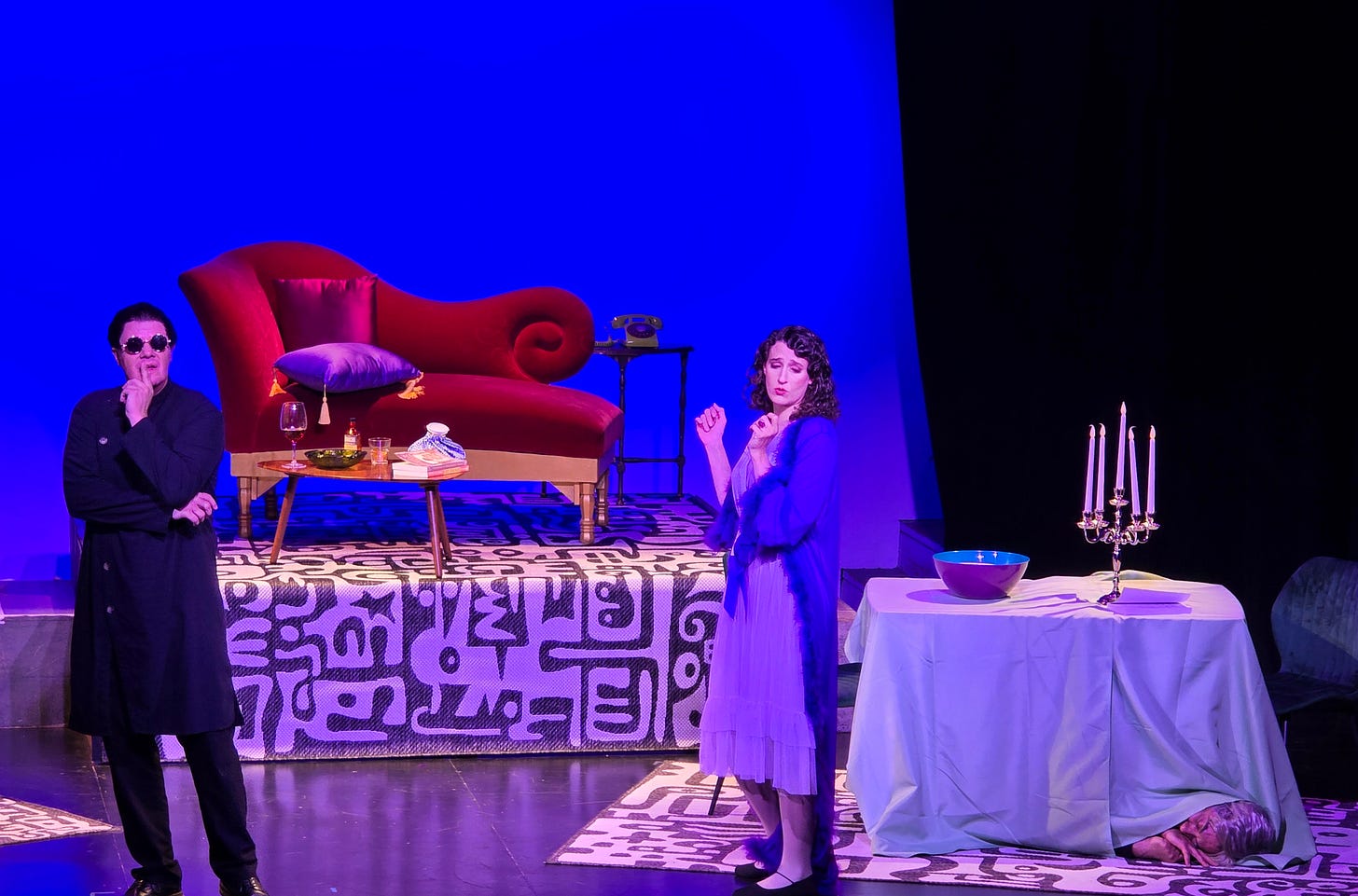
Tartuffe, the operatic adaptation of Molière’s comedy by the Bay Area composer and librettist Kirke Mechem, was premiered in 1980 by the San Francisco Opera’s American Opera Project, and soon found its way onto all sorts of operatic stages. It’s easy to understand why — the piece is vivid, tuneful, entertaining, and very funny. Its musical demands are light enough to make it catnip for small companies but sufficiently meaty that listeners feel they’ve actually had an operatic experience.
The production by Pocket Opera that opened Sunday afternoon at the Berkeley Hillside Club made a wonderful case for it. A skilled ensemble cast embraced Mechem’s lyrical, ingratiating melodic style with gusto, and director Nicolas A. Garcia nimbly underscored the opera’s mix of tenderness and humor.
Baritone Eugene Brancoveanu gave a sonorous, hilariously oily performance as the titular hypocrite, who uses a show of ostentatious piety to weasel his way into the household and bank account of the gullible Orgon (Isaiah Musik-Ayala). Soprano Shawnette Sulker was a piquantly entertaining maid, and soprano Courtney Miller contributed a bravura turn as Orgon’s wife Elmire. Comic opera that boasts the fleetness and brio of classic farce is all too rare; embrace it when you have the chance.
Tartuffe: Pocket Opera. June 22, Legion of Honor; June 29, Mountain View Center for the Performing Arts. www.pocketopera.org.
Elsewhere:
Lisa Hirsch, SFCV: “Tartuffe is dramatically well structured, singable, and balances a minimum of pure conversation with arias, duets, and trios. It is also, importantly, very funny.”
Cryptic clue of the week
From Out of Left Field #272 by Henri Picciotto and me, sent to subscribers last Thursday:
The first night in Paris with indigenous person (5)
Last week’s clue:
Very dry, yet containing a hint of richness (4)
Solution: BRUT
Very dry: definition
yet: BUT, containing…
…a hint of richness: R
Coming up
• San Francisco Symphony: Back in September, the San Francisco Symphony and Chorus were all set to perform the Verdi Requiem to begin Esa-Pekka Salonen’s final season. That didn’t happen, but now we have the chance to hear the piece led by conductor James Gaffigan, along with a starry quartet of vocal soloists (Rachel Willis-Sørensen, Jamie Barton, Mario Chang, and Morris Robinson) and Jenny Wong’s virtuosic chorus. Also on the program are choral works by Mozart and Gordon Getty. June 20 and 22, Davies Symphony Hall. www.sfsymphony.org.


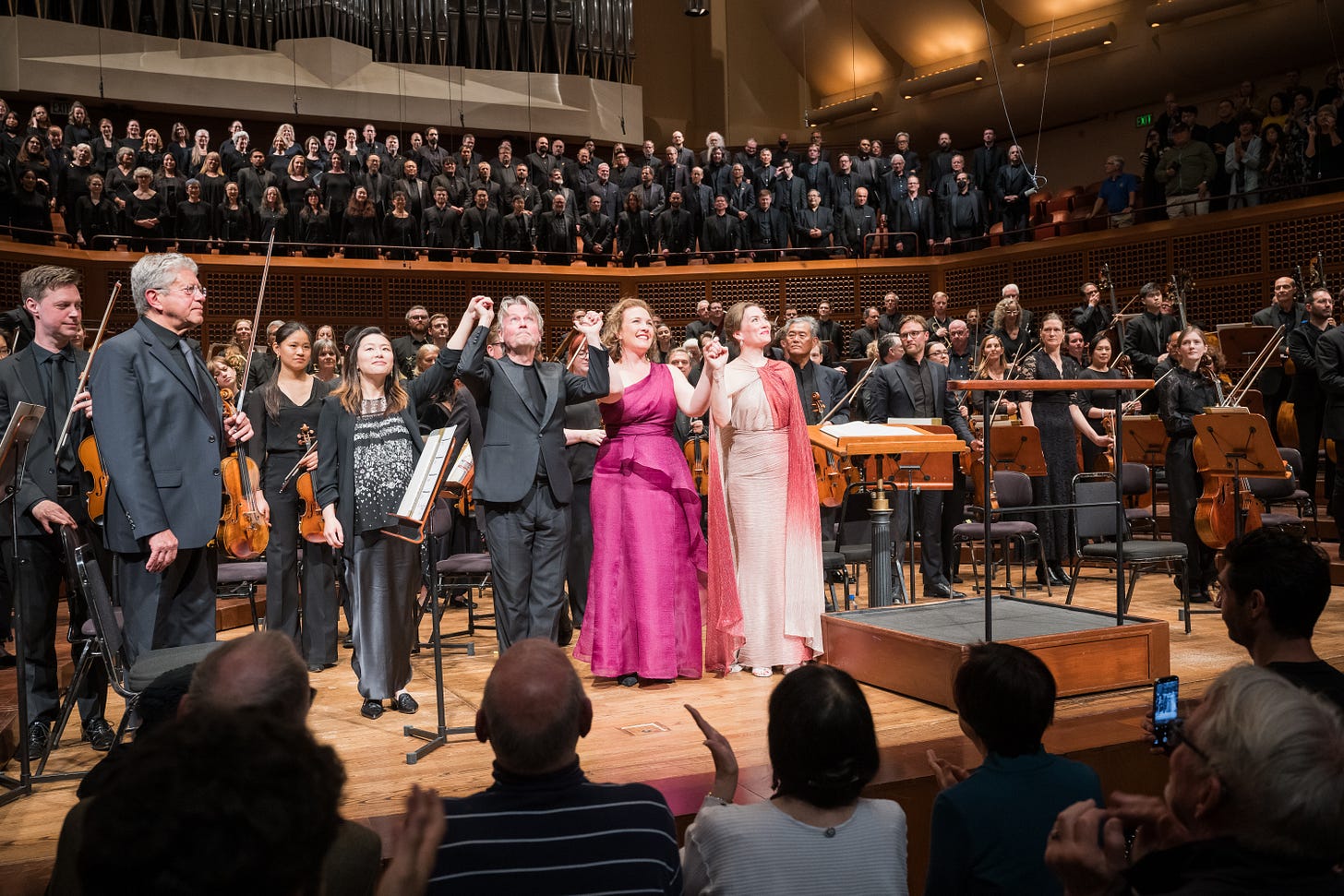
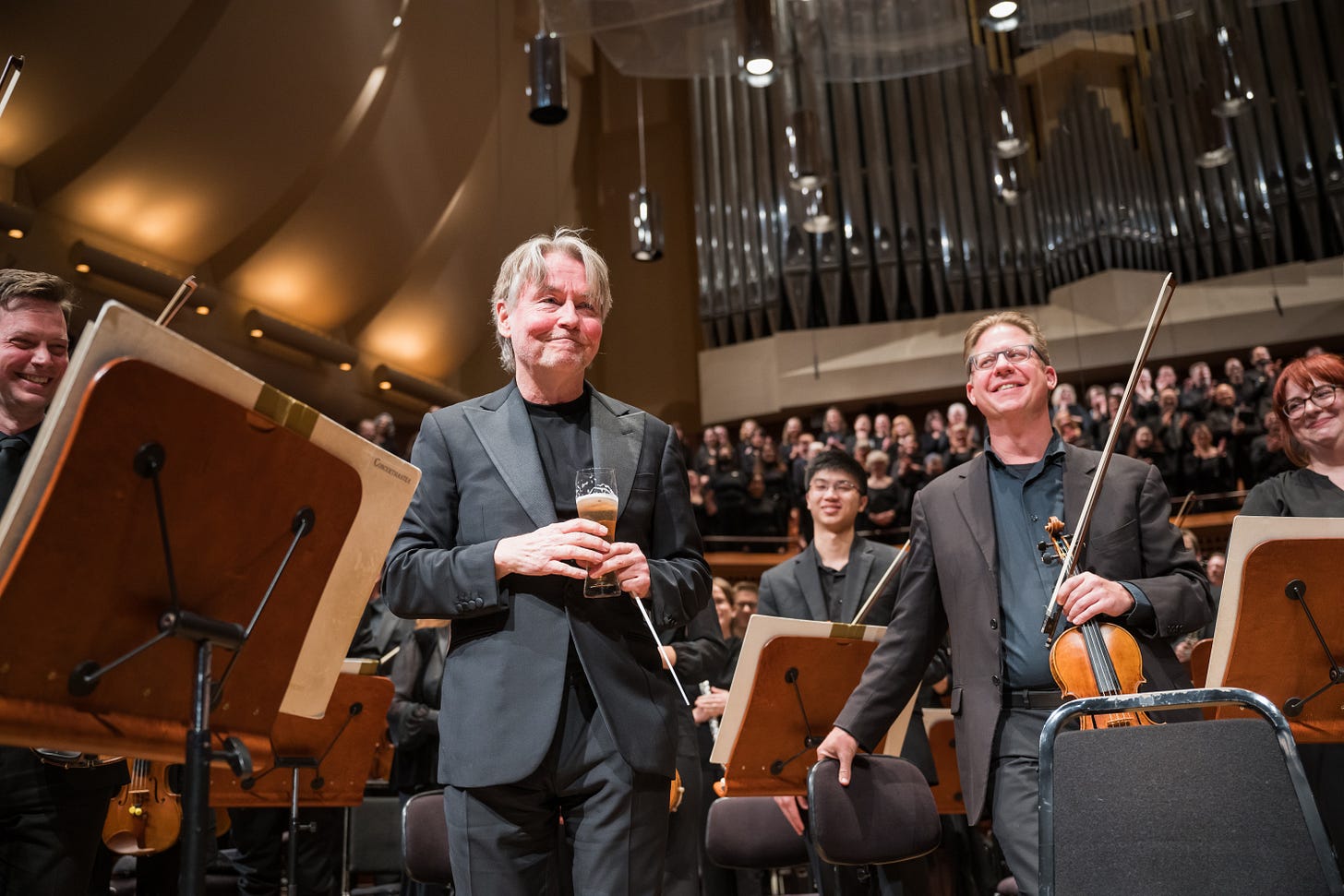
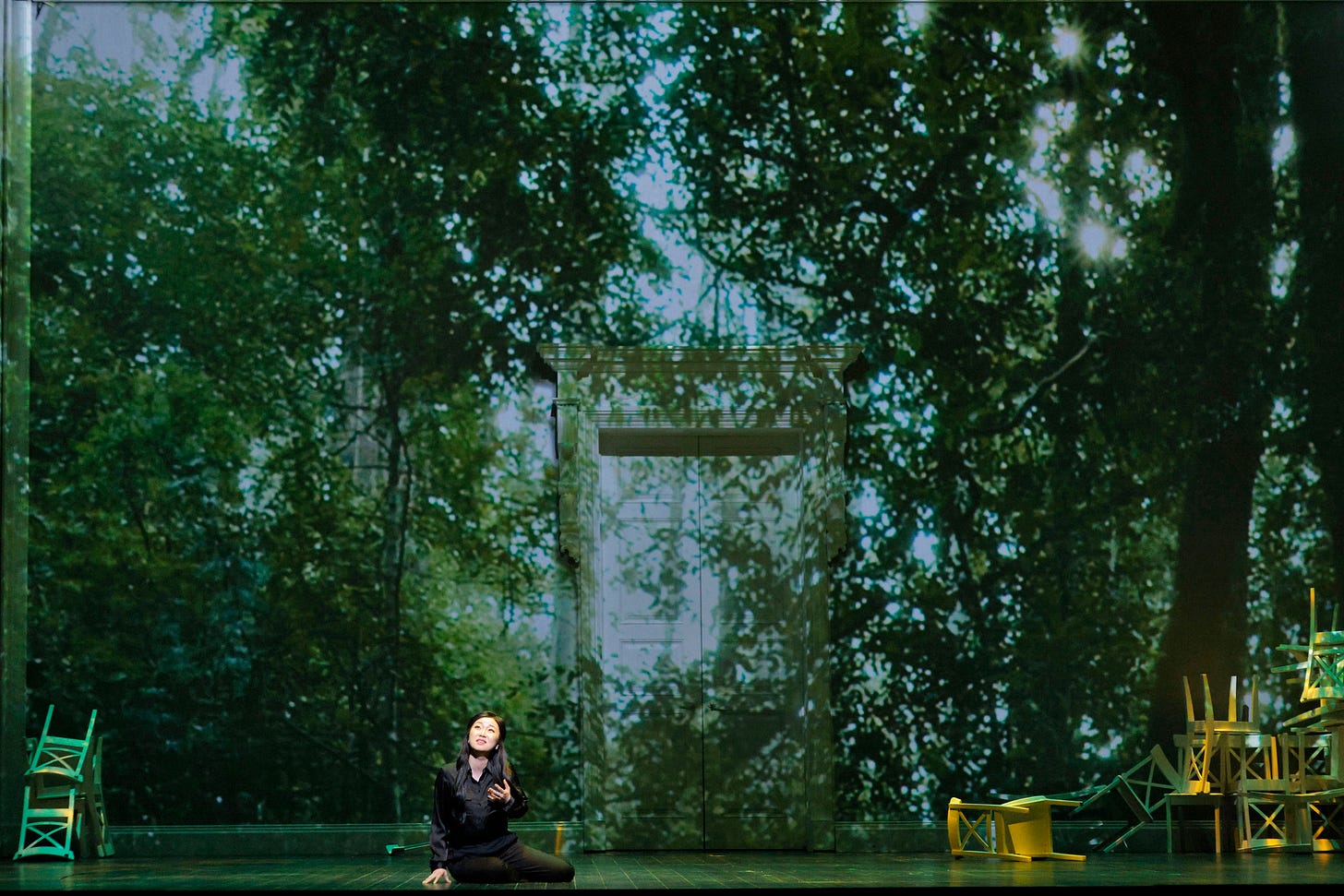
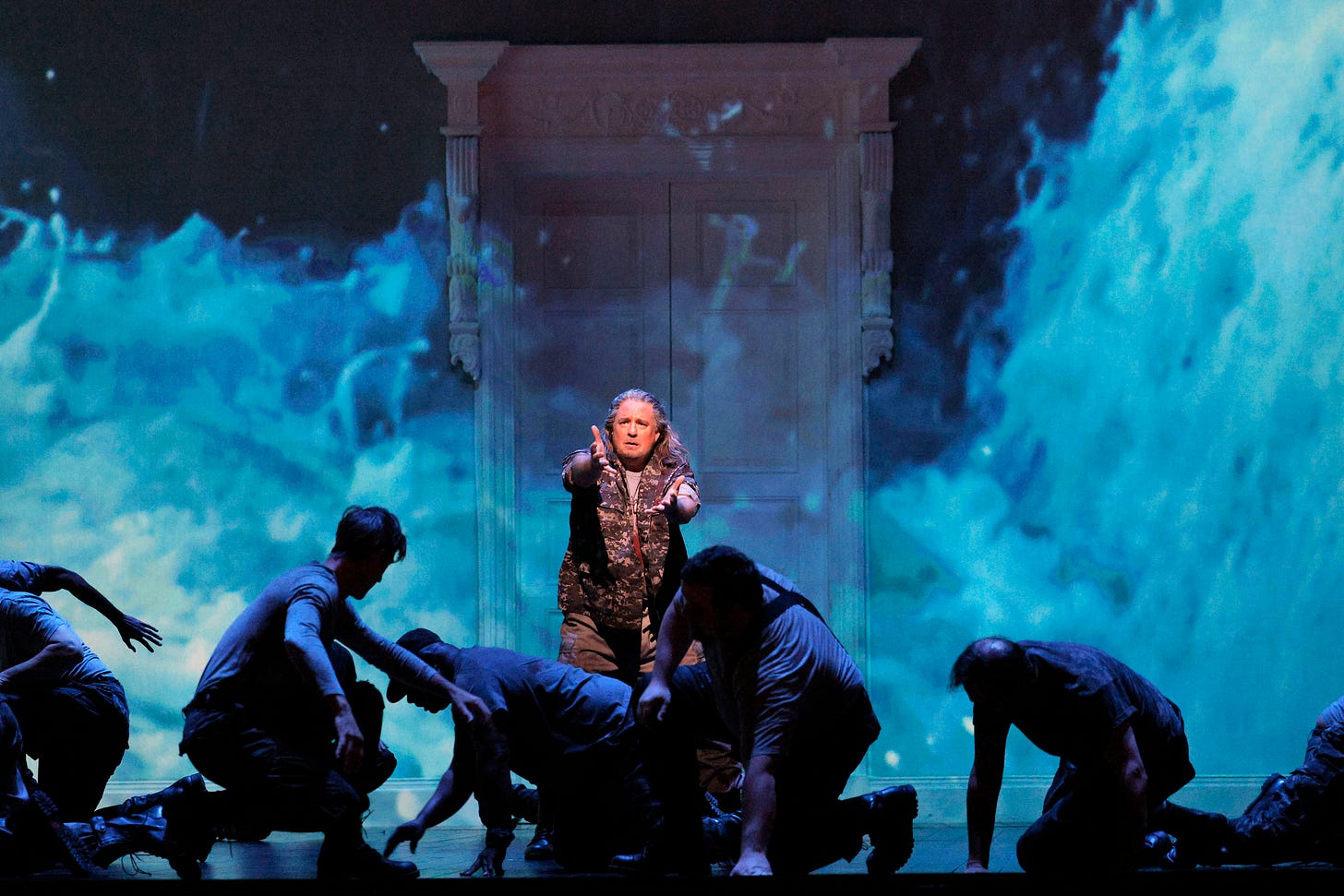
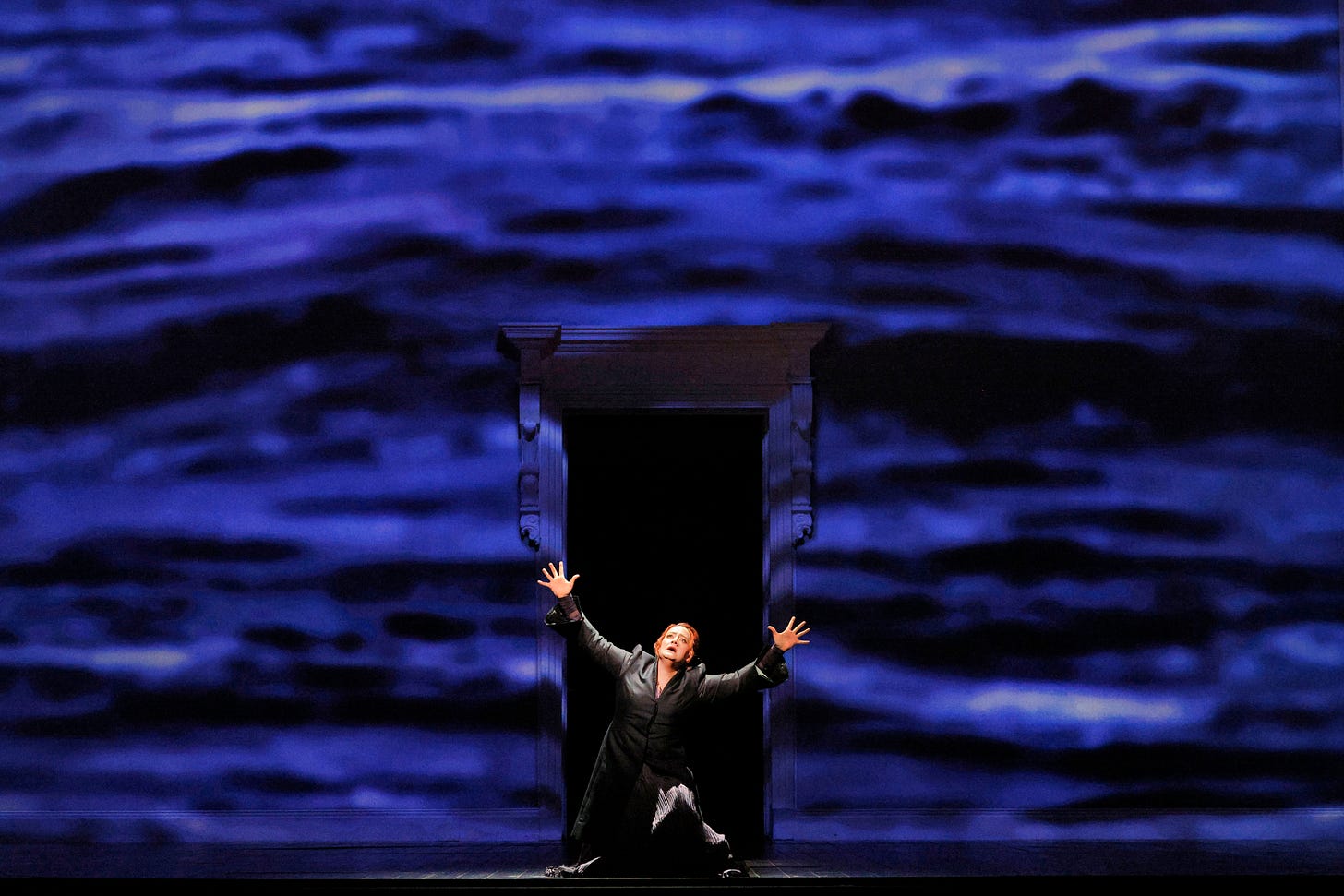
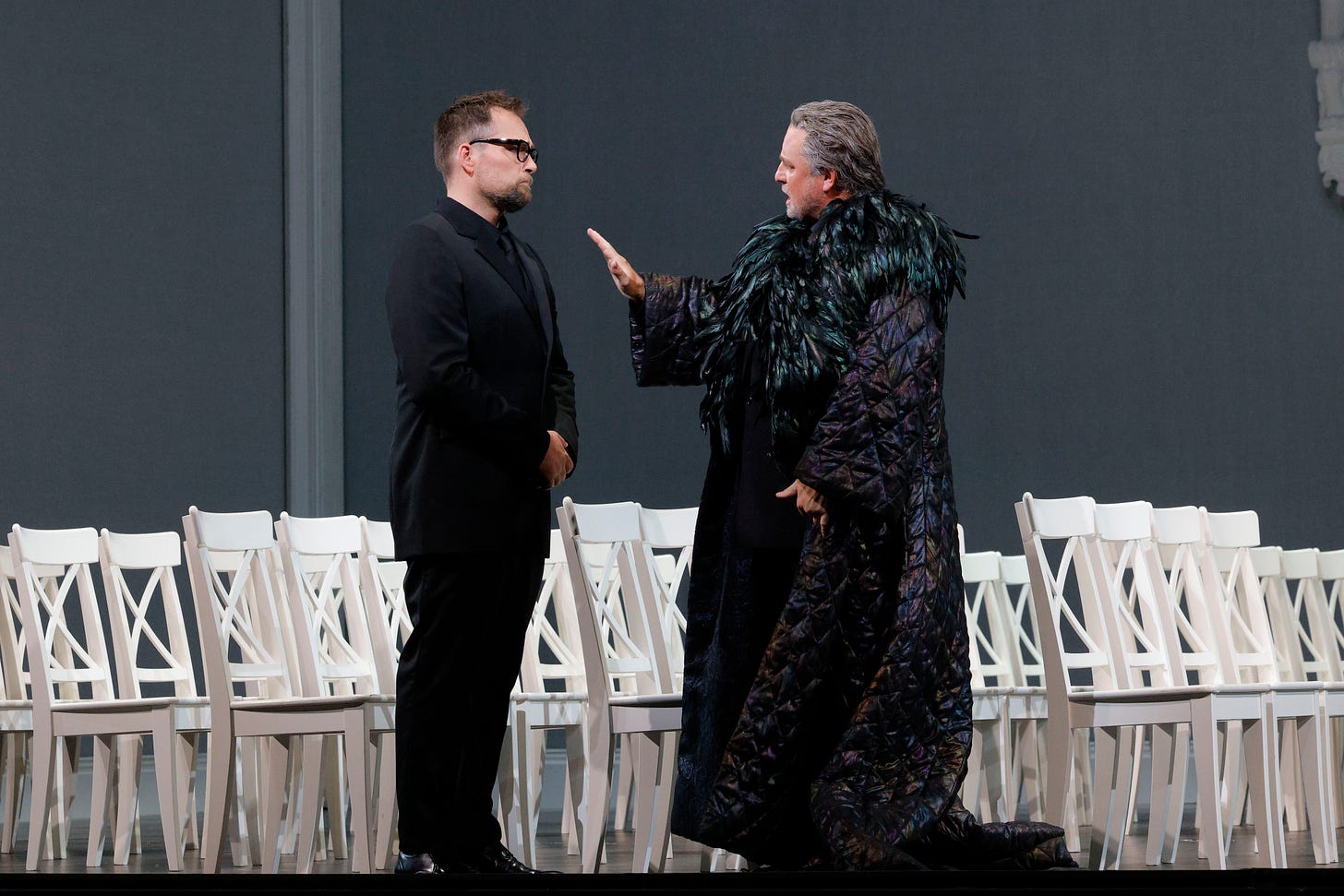
"We’ve been watching a preventable catastrophe unfold around us, as we stand on the sidelines yelling “nooooooo” like the witnesses to some cheesy slow-motion film collision. And none of it makes any sense! Who wanted this? Who benefits? Why would anyone look at the current situation and think The way to make (this orchestra) really great would be to (drive out one of the world’s leading music directors)?" seems to apply to so much of what is going on in the world today. We apparently don't know how to make anything great again but we sure are good at making things worse.
It really is a travesty. It's hard to imagine anyone with a robust commitment to new work taking the job in the current climate... SAD!